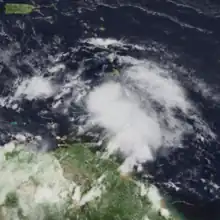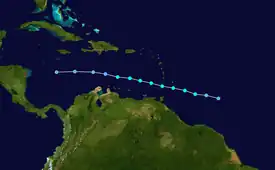Tropical Storm Danielle (1986)
Tropical Storm Danielle was the only tropical storm to move through the Caribbean Sea in 1986. A short-lived cyclone, Danielle developed on September 7 to the east of the southern Lesser Antilles. Strengthening to peak winds of 60 mph (95 km/h), the storm moved through Saint Vincent and the Grenadines, where a rainband moved across the main island with hurricane-force gusts. Continuing westward, Danielle absorbed dry air from northern South America and dissipated on September 10.
 Tropical Storm Danielle at peak intensity over the Windward Islands on September 8 | |
| Meteorological history | |
|---|---|
| Formed | September 7, 1986 |
| Dissipated | September 10, 1986 |
| Tropical storm | |
| 1-minute sustained (SSHWS/NWS) | |
| Highest winds | 60 mph (95 km/h) |
| Lowest pressure | 1000 mbar (hPa); 29.53 inHg |
| Overall effects | |
| Fatalities | None reported |
| Damage | $10.5 million (1986 USD)[nb 1] |
| Areas affected | Lesser Antilles |
| IBTrACS | |
Part of the 1986 Atlantic hurricane season | |
The threat of Danielle prompted gale warnings in Barbados as well as Saint Vincent and the Grenadines. On the former island, wind gusts reached 40 mph (64 km/h). On Saint Vincent, the winds caused a major power outage, while heavy rainfall left crop damage. Another rain system affected the country a few weeks later, and the combined monetary damage totaled $9.2 million (1986 USD, $18 million 2010 USD); 142 people had to seek shelter after their homes were destroyed, and a total of 436 dwellings were impacted to some degree. In Trinidad and Tobago, the outer rainbands produced flooding and mudslides. Further west, Danielle briefly threatened Jamaica, although it dissipated before affecting the island.
Meteorological history

Tropical storm (39–73 mph, 63–118 km/h)
Category 1 (74–95 mph, 119–153 km/h)
Category 2 (96–110 mph, 154–177 km/h)
Category 3 (111–129 mph, 178–208 km/h)
Category 4 (130–156 mph, 209–251 km/h)
Category 5 (≥157 mph, ≥252 km/h)
Unknown
Around September 1, a tropical wave moved off the western coast of Africa. It progressed westward through the tropical Atlantic Ocean, initially at a moderate speed before accelerating to 23 mph (37 km/h) on September 6. A tropical depression developed along the tropical wave early on September 7, and satellite imagery indicated that it quickly intensified into Tropical Storm Danielle about 385 mi (620 km) east-southeast of Grenada, an island in the Lesser Antilles.[1][2]
On September 8, Hurricane Hunters flew into Tropical Storm Danielle and reported maximum sustained winds of 60 mph (95 km/h), as well as a pressure of 1,000 millibars (30 inHg).[1] Initially, forecasters anticipated Danielle would strengthen further.[3] As the storm moved through Saint Vincent and the Grenadines, a rainband north of the center contained winds of near hurricane force, which moved across the island of Saint Vincent. After maintaining peak winds for about 18 hours, Danielle began weakening in the eastern Caribbean Sea,[1] due to entrainment of dry air from northern South America.[4] Paralleling the northern coast of the continent, the circulation became dislocated from the convection. Late on September 9, the system weakened to tropical depression status, and the next day it dissipated in the western Caribbean.[1] It was the only tropical cyclone in the Caribbean Sea during 1986.[2]
Preparations and impact
Before Tropical Storm Danielle moved through the Lesser Antilles, a small-craft advisory was issued, and later, gale warnings were posted for Barbados as well as Saint Vincent and the Grenadines.[5] On Saint Vincent, the threat of the storm forced the closure of the main commercial airport, as well as schools, businesses, and stores.[6] Further west, Danielle briefly posed a threat to Jamaica, prompting officials in that country to issue a tropical storm watch.[7] Two months earlier, the precursor to Tropical Storm Andrew killed 49 people on the island; to avoid a recurrence, the Jamaican government worked to evacuate fishermen from two small islands as a precaution.[8]
As Danielle moved through the Lesser Antilles, a rainband struck the island of Saint Vincent with wind gusts of near hurricane-force. The winds caused a major power outage on the island,[1] and destroyed the roofs of more than 30 houses.[6] Elsewhere in the country, the combination of winds and heavy rains caused heavy crop damage.[1] Twelve days after Danielle struck, a severe rainstorm affected Saint Vincent and the Grenadines. The combined disasters produced a damage total of $9.3 million (1986 USD, $18 million 2010 USD), the majority of it from crop damage. About 40% of the banana crop was destroyed or unfit for cultivation, and 2,050 acres (8.3 km2) of other crops were seriously affected. The two storms caused the deaths of 120 animals, although there were no human fatalities. In addition to the crop damage, the combined impact of the two storms left over 100 houses destroyed, with a total of 436 dwellings damaged; this forced 142 people to seek emergency shelter. Across the country, the heavy rainfall caused mudslides and flooding which disrupted the transportation and utility network.[9]
During its passage, Danielle produced a 40 mph (64 km/h) wind gust at the airport in Bridgetown, Barbados.[3] A coast guard ship from Barbados ran aground into a reef in the southern Grenadines, but it was rescued.[1][6] Further south, rainbands from Danielle swept through Trinidad and Tobago, producing up to 4 feet (1.2 m) of flooding. The flooding caused 27 landslides and destroyed 4 bridges. Damage in the country was estimated at $8 million (1986 TTD, $1.2 million 1986 USD).[10]
Notes
- Monetary damage total includes losses from a subsequent storm unrelated to Danielle.
References
- Gilbert B. Clark (1986). "Tropical Storm Danielle Preliminary Report". National Hurricane Center. Retrieved 2010-08-09.
- "Atlantic hurricane best track (HURDAT version 2)" (Database). United States National Hurricane Center. April 5, 2023. Retrieved October 25, 2023.
 This article incorporates text from this source, which is in the public domain.
This article incorporates text from this source, which is in the public domain. - Jane Meinhardt (1986-09-08). "Tropical Storm Danielle is expected to slowly strengthen, turn northward". The Evening Independent. Retrieved 2010-08-11.
- Verne Williams (1986-09-10). "Danielle fizzles, is downgraded to a tropical wave". Miami Herald. Retrieved 2010-08-11.
- "Storm Danielle Forms Off Barbados". The Palm Beach Post. Associated Press. 1986-09-08. Retrieved 2013-10-27.
- Andrea Rowand (1986-09-10). "Danielle Loses Punch On Way to Caribbean". The Day. Associated Press. Retrieved 2010-08-11.
- Verne Williams (1986-09-10). "Danielle's course prompts storm watch for Jamaica". The Miami News. Retrieved 2010-08-11.
- Staff Writer. "Danielle weakens, loses storm status". Mojave Daily Miner. United Press International. Retrieved 2010-08-11.
- United Nations Department of Humanitarian Affairs (DHA) (1986-10-06). "St. Vincent Tropical Storm Danielle Sep 1986 UNDRO Situation Reports 1–2". ReliefWeb. Retrieved 2010-08-11.
- C. B. Daniel and R. Maharaj (1986). "Tropical Cyclones Affecting Trinidad and Tobago, 1725 to 2000". Trinidad and Tobago Meteorological Service. Retrieved 2010-08-11.
